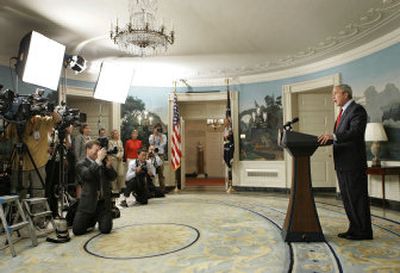Bush tightens sanctions against Sudan

WASHINGTON – The new economic sanctions on Sudan that President Bush ordered Tuesday are the most stringent yet aimed at ending the genocide in Darfur, but they’ll have an impact only if governments in Europe and elsewhere follow suit, current and former U.S. officials said.
Bush announced three new steps against the Khartoum government, which he accused of obstructing United Nations efforts to end the violence that’s killed more than 200,000 people and left 2 million homeless.
The Treasury Department is barring 30 Sudanese firms, including several involved in oil and military sales, from the U.S. financial system; it’s blacklisting two aides to President Omar el-Bashir as well as a rebel leader; and it will step up enforcing sanctions based on what U.S. officials said were enhanced financial intelligence-gathering techniques.
Andrew Natsios, Bush’s special envoy for Sudan, said the White House hoped that the moves would pressure Bashir into accepting the deployment of a 23,000-person joint African Union-U.N. peacekeeping force for Darfur.
Privately, U.S. officials involved in Sudan policy acknowledged that the key to success will be to get the European Union on board. China, a major player in Sudan’s oil industry, has repeatedly blocked tougher U.N. action.
“The key to these sanctions is the Europeans doing the same thing,” said a State Department official who spoke on condition of anonymity to be more frank.
“The main weakness is, again, they’re simply unilateral U.S. sanctions,” said David Mozersky, an analyst in Washington with the International Crisis Group. “They don’t add much to what has already been in place the last 10 years, frankly.”
Javier Solana, the 27-nation European Union’s foreign policy chief, told the Reuters news agency that the EU, a major trading partner for Sudan, is “open to consider” additional sanctions.
Sudan’s government, which has been signaling a more conciliatory stance on its Darfur region in recent weeks, expressed surprise at Bush’s announcement.
“Now the process of peace is going forward, and Sudan is studying the proposal (for the expanded peacekeeping force) with the U.N. Security Council,” said Rabie Abdul Atti, a senior official in the Sudanese Information Ministry. “I’m surprised at why (U.S. officials) are escalating the issue.”
In announcing the sanctions early Tuesday, Bush accused Bashir of “a long pattern of promising cooperation while finding new methods for obstruction.”
Darfur activists dismissed the unilateral actions as having little potential impact.
“Unless the U.S. takes the decision to press hard in the U.N. Security Council for a meaningful resolution that sanctions the top ringleaders (in Bashir’s government) and multilateralizes the sanctions … there will be no bite to this endless barking,” three members of the Enough Project, which campaigns against genocide, wrote in an analysis.